More than 600 participants attended the webinars at the Construction’s Innovative Training Week
From 27th to 29th October, Fundación Laboral organised three virtual meetings to tackle the current challenges in the sector, in which the results of European initiatives were presented, such as: Health and Safety Blueprint, VRoad, Women Can Build, Construye 2020+, Construction Blueprint, CDWaste and Si!BIM.
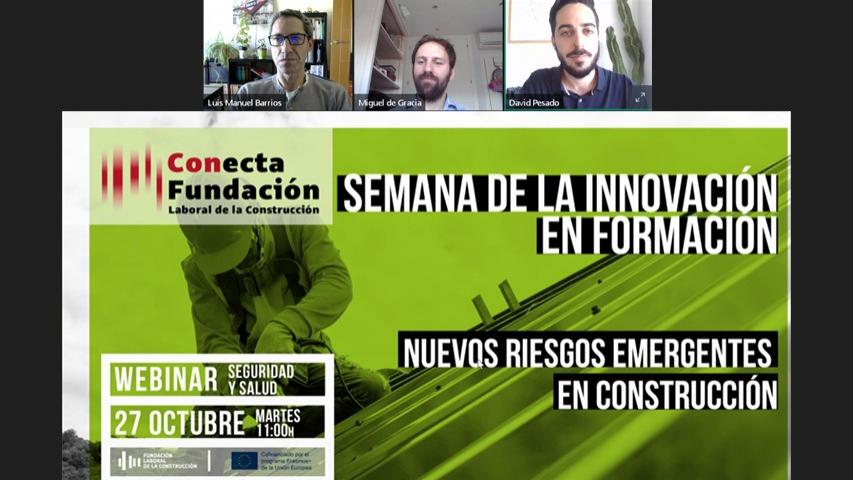
-
 Miguel de Gracia (en el centro), junto con Luis Manuel Barrios (izquierda) y David Pesado, responsables de VRoad y H&S Blueprint, respectivamente.
Miguel de Gracia (en el centro), junto con Luis Manuel Barrios (izquierda) y David Pesado, responsables de VRoad y H&S Blueprint, respectivamente. -
 Mesa redonda sobre nuevos riesgos emergentes.
Mesa redonda sobre nuevos riesgos emergentes. -
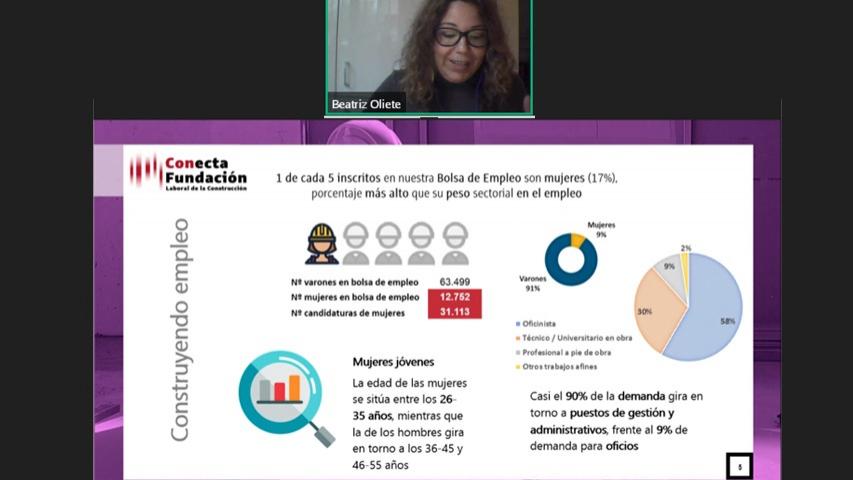 Beatriz Oliete, responsable de Women Can Build, expuso la situación de la mujer en el sector.
Beatriz Oliete, responsable de Women Can Build, expuso la situación de la mujer en el sector. -
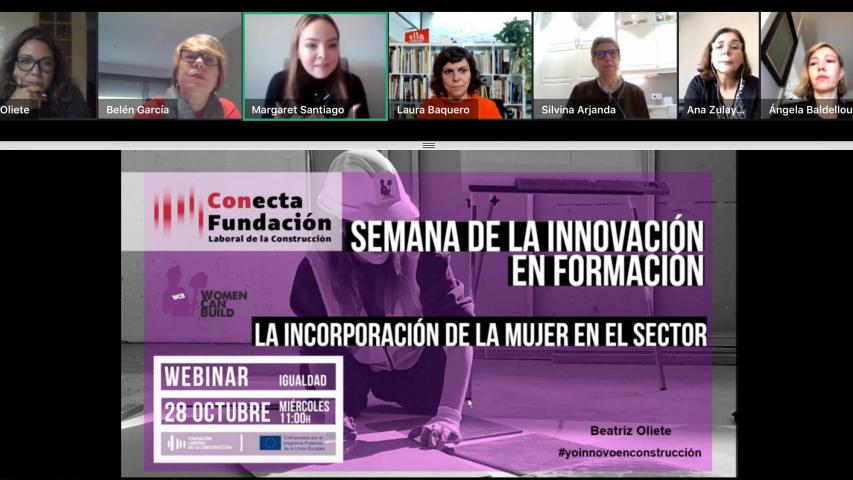 Debate sobre los retos para la incorporación de la mujer en la construcción.
Debate sobre los retos para la incorporación de la mujer en la construcción. -
 José Antonio Viejo, director de Formación y Empleo de la Fundación, ofreció el contexto actual en el que se encuentra el sector.
José Antonio Viejo, director de Formación y Empleo de la Fundación, ofreció el contexto actual en el que se encuentra el sector. -
 Clara García, responsable de CDWaste, comentó el modelo lineal que todavía mantiene la construcción.
Clara García, responsable de CDWaste, comentó el modelo lineal que todavía mantiene la construcción. -
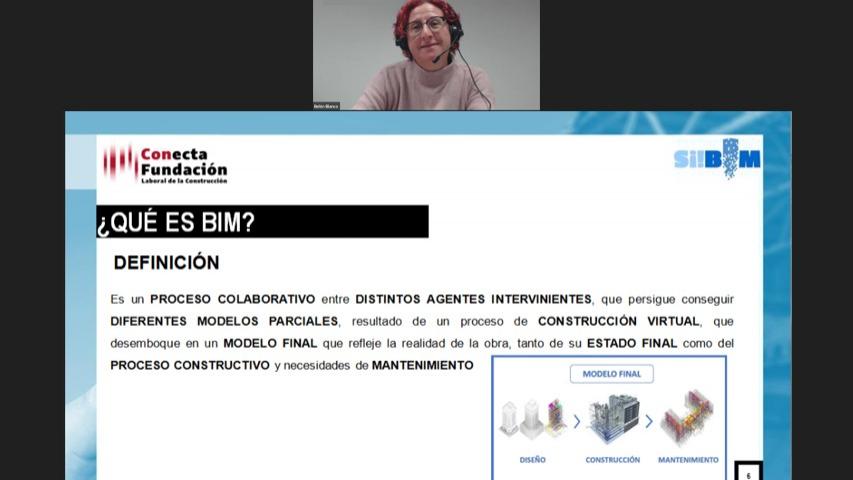 Belén Blanco, responsable de SI!BIM, explicó qué es BIM y qué no lo es.
Belén Blanco, responsable de SI!BIM, explicó qué es BIM y qué no lo es. -
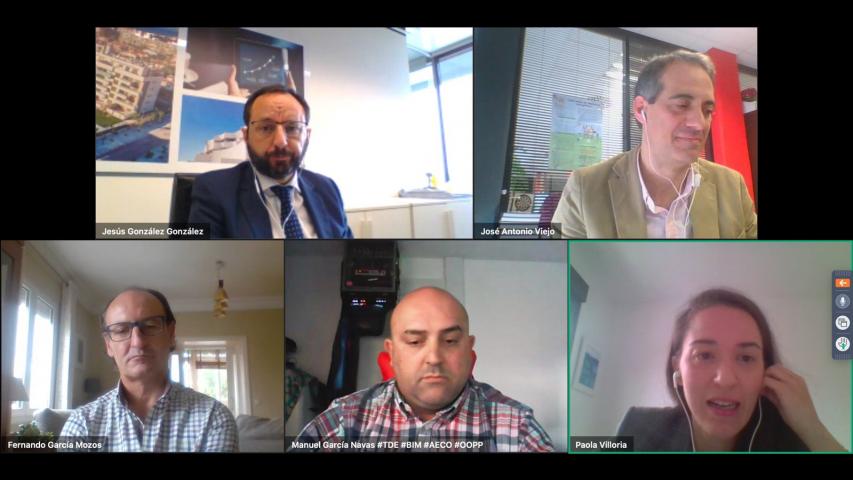 Mesa redonda sobre construcción sostenible y digitalización.
Mesa redonda sobre construcción sostenible y digitalización.
Anticipating the European Vocational Skills Week, Fundación Laboral de la Construcción organised, from 27th to 29th October, the Construction’s Innovative Training Week with three webinars to address the current challenges of the sector, professionals and companies. More than 1,000 registrations were registered, and finally 620 participants logged on during the three virtual days: the first, on "New emerging risks in construction", brought together a total of 209 people; the second, on "Integration of women in the sector", 172 attendees; and the last, on "Sustainable construction, digitalisation and the circular economy", 239.
This is an annual event that began in 2018, in which the International Projects Department of Fundación Laboral presents the results of the European initiatives that they coordinate and participate in.In this third edition, the advances of Health and Safety Blueprint, VRoad, Women Can Build, Construye 2020+, Construction Blueprint, CDWaste and Si!BIM were presented through virtual meetings in line with safety measures and to avoid the risks of coronavirus, through Conecta Fundación, the digital initiative that the entity promoted last April to continue its dissemination work.
Miguel de Gracia, head of this department, opened the Innovative Week by highlighting the importance of this type of event for the entity: "Innovation is presented as a strategic factor to be able to respond to the challenges of a sector, which is called to be more sustainable and more efficient. It is one of the main drivers to promote the pillars of the Fundación, which are Training, Health and Safety, and Employment".
In a European context in which the 2020 Objectives have expired, with a new global framework, renewed by the United Nations' Sustainable Development Goals (SDGs). The transformation of the construction industry requires that companies, professionals and agents of the industry achieve a sector more secure, equal, sustainable, digitalised and that incorporates the principles of the circular economy. These are the main drivers towards a modern and competitive industry.
Focusing on prevention, through training
The growth of construction towards a more sustainable and efficient industry affects professionals, not only for the training needs of the labour market, but also for their safety. The webinar on "New emerging risks in construction", held on October 27, addressed the prevention framework, in which Fundación Laboral has developed the Health and Safety Blueprint a European Commission tender.
Thus, a training framework has been designed to cover the gaps in Health and Safety skills related to energy efficiency or renewable energies, and in the use or management of biomaterials. David Pesado, International Projects Officer and in charge of this tender, presented the outcomes and the H&S Blueprint online course that the entity has created on Occupational Health and Safety focused on the new profiles of 'green professionals'.
Following the commitment to workers' health and well-being, Luis Manuel Barrios, International Projects Officer and in charge of the VRoad project, showed the virtual reality application of this Erasmus+ initiative. Which offers an immersive experience to roadwork professionals, so that they can learn about the risks of these jobs without real exposure.
During the following round table, experts in prevention, training, gamification and road works held an interesting debate. According to Antonio Santander, head of Health and Safety Projects at Fundación Laboral: "The new 'green trades' in construction can modify the occupational risks that we know and will have to be analysed in depth, so we (Prevention technicians) have to be ready for change". In addition, he remarked that "by 2030, 50% of the jobs will be occupied by professionals who have studied Vocational Training, so it is essential to create a certification of skills that recognises the competences of workers and helps them to understand and learn the specifications of their job and the risks they will face".
Alejandro San Vicente, an expert in occupational risk prevention and energy management, and Associate Professor at the University of La Rioja, said: "Most of the risks are invisible risks, chemical risks; that is why our work is to raise awareness so that professionals can anticipate the risks and train themselves".
However, the new training demand makes it clear, as Santiago Martín Luengo, trainer at Foundation and expert in road works, explained: "Training the trainer is fundamental".
For her part, Ainara Ruiz, Project Manager at GA Group, said that new training needs can be developed by technology: "ICTs offer us a very adaptive framework. We have several tools, including gamification, which allow us to adapt very quickly and have the great advantage of allowing us to focus on these profiles".
Betting on female talent
Despite the number of female construction workers has increased, and the interest of young women to approach this sector, the presence of women on construction sites remains a challenge. The present and future goals have been discussed at the webinar on "Integration of women in the sector", held on October 28th.
Beatriz Oliete, Senior Officer of International Projects at Fundación Laboral and in charge of the European project Women Can Build, says: "When talking about the context, we must refer to a multi-causal factor, both historical and socio-cultural in the assignment of roles: on one hand, there are the women, who do not see an attractive sector; and, on the other, there are the companies or the environment, which affects their integration". For her part, Belén García, manager of the Employment Agency (AE) of Madrid City Council, highlighted the "gratifying work" with Fundación Laboral, during these three years, and with the other partners, in the Women Can Build project and the results achieved.
Ángela Baldellou, Director of the 2030 Observatory of the Spanish Higher Council of Associations of Architects (Consejo Superior de Colegios de Arquitectos de España -CSCAE-), highlighted the low presence of "female" professionals in management positions and in trades. The greatest number of women in construction being in administrative positions: "This means that female talent is not being used. Despite the fact that from the 2000s onwards, women graduates in architecture outnumbered their male colleagues by ten points".
Margaret Santiago, gender expert and Coordinator of Alliances with Companies in the Spanish Red Cross' project for the insertion of women at risk 'Bridges to Employment', argued that "bridges must be built between women and companies, to bring them into contact". From the Red Cross, they have found barriers, often invisible, from the women themselves to the sector: "Sometimes they have a personal role as educators or carers, in which the trades have no place. That is why we must focus on this industry, and manage to create new opportunities that allow women to be kept or empowered to be part of the sector".
Fortunately, there are more and more women who want to get involved in the sector, like Laura Baquero - businesswoman, architect and founder of 'Ella Construye' - who shared her difficult experience to find her voice in a 'masculinised' sector.
A situation in which her gender condition was compounded by her youth and inexperience: "After maternity it was hard for me to return to the labour market. Until I met Women Can Build, which was one of the few projects on women in construction that you could find on internet three years ago. I contacted them, who offered their help, giving me figures, documents, contacts... And I won the Madrid City Council's prize for women entrepreneurs with this idea, which became 'Ella Construye', an interior remodeling company that bets on the curricula vitae of professional women".
Ana Zulay and Silvina Aranda, two of the students who participated in the Women Can Build pilot course on "" Introduction to the Sector ", explained that when they lost their jobs, and as a result of their experience in this course, they saw a second opportunity in construction. Aranda has discovered a labor market with opportunities and the possibility of growth, and she is clear about the need to continue preparing herself: "To do things, in addition to desire and attitude, you have to be trained.
We talk about the future, we talk about construction
José Antonio Viejo, Director of Training and Employment Department at Fundación Laboral, was in charge of driving the third virtual day on "Sustainable construction, Digitalisation and Circular Economy" on October 29th, and finishing the third edition of the Construction’s Innovative Training Week. During this session were addressed the three major challenges of the European industry. According to Viejo: "The origin is found in the Europe 2020 Strategy, which required in climate and energy issues a reduction of greenhouse gas emissions, the use of renewable energy and increased energy efficiency.
These were the steps that guided construction to present and which Fundación Laboral has been working on for decades from its International Projects department: coordinating in Spain the initiatives Build Up Skills Spain (2011-2013), Construye 2020 (2013-2016), and now, Construye 2020+ that proposes the updating of the Build Up Skills courses -designed in the first initiatives-, with the objective of "recognizing workers that are being trained or that have training in sustainable construction, and that these be reflected through a 'green tag' or included in the Professional Construction Card, so that housing users can know which workers are competent and which can perform an efficient installation," according to Viejo. And leading in Europe initiatives such as Construction Blueprint that aims to "create stable mechanisms over time that anticipate the skills needs of the sector, so that the Vocational Training centers can develop skills and respond to the demands".
Together with these two projects, CDWaste and Si!BIM were presented. These projects respond to the double digital and sustainable transition of the industry, included in the Skills Pact, as a reply to the European Skills Agenda for sustainable competitiveness, social equity and resilience, which is currently being worked on by the European Commission and there is no known publication date. Clara Garcia, International Projects Officer and in charge of the CDWaste project, highlighted that this initiative proposes to update the skills of Construction and Demolition Waste Management (CDW) through the training of professionals. For its part, Belén Blanco, International Projects Officer and in charge of Si!BIM, pointed out that this project aims to raise awareness among trainers and trainees to use digital tools, especially Building Information Modeling (BIM), to connect the building processes.
This webinar included a discussion among experts in the field of circular economy, sustainability and digitalization. Fernando García Mozos, Head of the Household and Buildings Department of the Energy Saving and Efficiency Directorate of the Institute for Energy Diversification and Saving (Instituto para la Diversificación y Ahorro de la Energía -IDAE-), it is essential to invest in materials that increase the life cycle of buildings and in complete renovations: "We must bet on rehabilitation, because the resource use is lower than in a new construction; moreover, currently there is no business network that offers complete renovation solutions, or that manages to persuade user that custom-made solutions are the best option to increase the life of their homes".
Without a doubt, this holistic vision of the construction process is the one that Paola Villoria, Professor at the Polytechnic University of Madrid and expert in building waste management, addressed, since this complete renovation is connected to the digitalization of the industry: "The digital revolution will help to boost the circular economy through knowledge transfer. Preventing waste and recycling materials on a site must be done from the design phase. In this sense, agents involved in the first phase of construction - designers, etc. - must think about demolition, using materials that have more life and less maintenance. And this is where BIM can help to incorporate environmental data in the construction phase, so that in a future rehabilitation of the building we have all the information possible".
Because BIM is not the future, it is the present, Manuel Garcia Navas, technical architect and building engineer, expert in digital transformation, BIM of companies and public agencies, and sector AECO (Architecture Engineering Construction Operations), said that "it is necessary that workers leave their comfort zone and bet on the use of digital tools to address this paradigm shift".
To conclude, Juan Jesús González, General Director of Corporate Planning and Organization of Avintia Group, presented the Avintia Building 4.0 model, with which through a first level software the different phases of the construction process are connected, taking into account the useful life of the building: "The construction period lasts 18 months, while the operation of the building extends to 35 years".
- "New emerging risks in construction".
- " Integration of women in the construction sector".
- "Sustainable construction, digitalization and circular economy".








